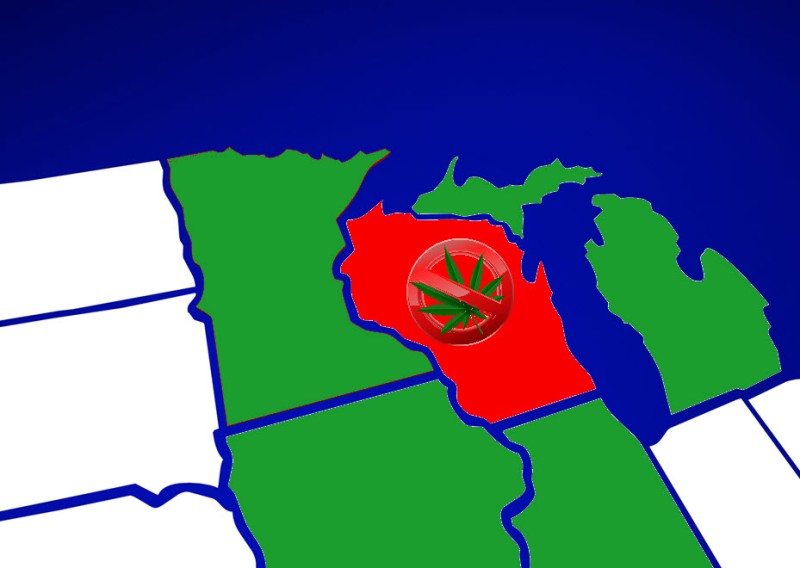
Surrounded By Legal Weed, Wisconsin Democrats Urge Change – Why Spend Money In Other States?
Wisconsin residents face a dilemma since they live in a state that strictly enforces marijuana prohibition while surrounding areas reap the benefits of legalization. This contrast has prompted Wisconsin Democrats to advocate for change, presenting a basic question: Why should Wisconsinites continue to export their money to other states when their own economy could thrive with a change in cannabis policy?
The recent adoption of recreational marijuana in Minnesota spotlights the potential economic gains that elude Wisconsin. As citizens cross state borders to access legal cannabis products, they inadvertently bolster neighbouring economies. The sincere desire among Wisconsinites to retain their resources locally, thereby nurturing community growth, is a driving force propelling the call for change. This article delves into the complex landscape of Wisconsin's cannabis debate, examining Democratic endeavours for reform, GOP recalibrations, and the broader impact of surrounding states' policies. As Wisconsin grapples with tradition and change, the chorus advocating for a paradigm shift grows louder, accentuating the pressing need for a comprehensive reevaluation of its marijuana regulations.
Encircled by Legalized Cannabis: Wisconsin Democrats Advocate Change – A Question of Expenditure
The recent waves of marijuana legalization sweeping through neighboring states have cast a glaring spotlight on Wisconsin's distinct position. As Minnesota opens its doors to legal recreational marijuana, Wisconsin residents find themselves in a peculiar predicament, witnessing the economic boom accompanying such policies just beyond their borders. While states like Minnesota, Michigan, Illinois, and Iowa reap the fiscal rewards of legal cannabis, Wisconsin remains on the outskirts of this burgeoning industry, prompting a chorus of voices to call for change.
The allure of legal marijuana sales in Minnesota acts as a siren's song, luring Wisconsinites across state lines in pursuit of accessible cannabis products. This departure of consumers translates to a drain on Wisconsin's potential revenue as neighbouring economies benefit from the influx of dollars. Senate Minority Leader Melissa Agard (D) captures the prevailing sentiment – Wisconsinites are eager to see their hard-earned income circulated within their communities, igniting local economic growth and job opportunities.
The widening gap between Wisconsin's stringent stance on marijuana and the progressive policies of its neighbours is palpable. The contrasting landscapes vividly depict economic disparity as other states capitalize on legal cannabis while Wisconsin hesitates. The frustration among Wisconsin residents witnessing the flow of money away from their state is growing, intensifying the push for reconsidering the status quo.
Unsuccessful Endeavors: Wisconsin's Struggle with Marijuana Policy Reform
The political struggle over marijuana legalization in Wisconsin has been marked by setbacks and missed opportunities. The rejection of over 500 proposals, including a cannabis legalization measure, by GOP lawmakers, dealt a blow to advocates of change. This sweeping dismissal, encompassing diverse proposals from Governor Tony Evers, reflects the deeply entrenched divisions within the state's political landscape.
Historically, Wisconsin's Republican lawmakers have stood firm against the prospect of legalizing adult-use cannabis. However, a noteworthy shift occurred in April when GOP legislators began crafting a medical marijuana (MMJ) program that could garner bipartisan support. The emergence of this MMJ-focused initiative hints at a potential middle ground in the ongoing debate, even as the broader issue of recreational cannabis legalization remains contentious.
The absence of any GOP-sponsored medical cannabis proposals in the current legislative session underscores the complexities that reform advocates face. Despite evolving perspectives within the GOP, the persistent lack of progress highlights the uphill battle that proponents of cannabis reform continue to navigate. The intricate dance between tradition and change, reflected in the failed attempts to push through substantive cannabis policy changes, adds layers of nuance to Wisconsin's ongoing dialogue on marijuana legalization.
As Wisconsin's political landscape remains divided, the frustration among cannabis advocates grows more pronounced. The failure of these proposals, including the rejection of funding for vital projects like stadium renovation, fuels a sense of missed opportunities. The disheartening reality that Wisconsin citizens continue spending resources in neighbouring states, contributing to their economies, underscores the urgency for meaningful reform. The failed attempts serve as a rallying cry for those who see the potential for economic growth and revitalisation within their communities, leading to a renewed determination to reshape Wisconsin's cannabis policies.
Ongoing GOP Efforts: Working Toward a Different Approach to Cannabis
Amidst the ebb and flow of Wisconsin's cannabis debate, a glimmer of change emerges as a group of GOP lawmakers takes tentative steps towards a new approach. The decision to craft a medical marijuana (MMJ) proposal signifies a subtle but significant shift within the Republican camp. While staunch opposition to recreational cannabis legalization persists, this internal recalibration suggests a willingness to explore alternative avenues.
The crafting of an MMJ program by Assembly Speaker Robin Vos (R) and fellow Republican legislators denotes a departure from historical orthodoxy. Set to be introduced in the upcoming fall session, this proposed measure marks a potential turning point in Wisconsin's cannabis narrative. Yet, the GOP's steadfast resistance to recreational legalization underscores the complexities of reconciling opposing viewpoints and finding common ground within the broader context of marijuana reform.
While promising, the evolution within the GOP highlights the intricacies of navigating a deeply polarised political landscape. The delicate balance between catering to traditional values and responding to changing public sentiment is palpable. As Wisconsin's political climate experiences a gradual transformation, this MMJ-focused initiative carries the weight of potential compromise, offering a glimpse into a future where the therapeutic benefits of cannabis could be harnessed without upending established norms.
While the MMJ proposal is a step forward, its limited scope leaves many cannabis advocates yearning for more comprehensive change. The absence of GOP-sponsored proposals for broader marijuana reform emphasises the ongoing challenges of aligning divergent perspectives. As the MMJ proposal takes shape, Wisconsin's journey toward cannabis reform remains a fluid and intricate dance, embodying the delicate process of harmonising a diverse range of viewpoints while steering the state toward a path of progressive change.
Bottom Line
Amid a rapidly evolving cannabis landscape across neighbouring states, Wisconsin finds itself at a pivotal juncture, grappling with the consequences of its steadfast prohibition stance. As nearby states reap the economic rewards of legal marijuana, Wisconsin Democrats passionately advocate for change, striving to channel local spending power and drive growth within their communities. However, a history of failed attempts, including the rejection of Governor Tony Evers' proposals, underscores the complexities of navigating the state's political divide. The recent GOP shift towards crafting a medical marijuana program offers a glimmer of compromise yet highlights the intricate dance between tradition and change. Against this backdrop, Wisconsin's cannabis future remains uncertain, symbolic of the broader dialogue sweeping the nation and demanding a delicate balance between established norms and the potential benefits of embracing legalized marijuana.






